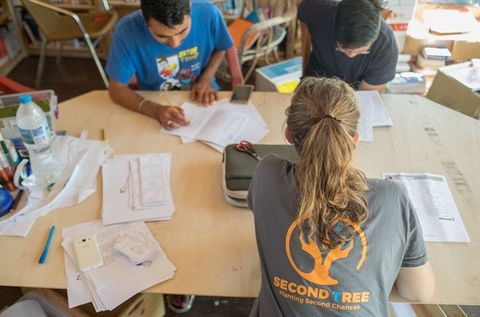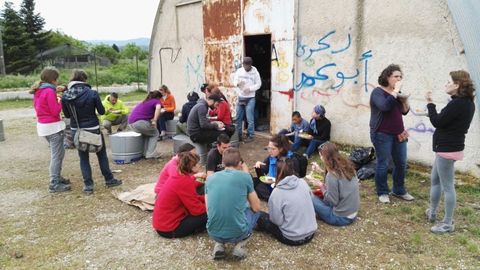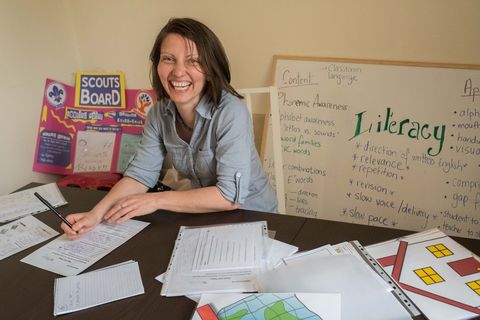


Silvia Romano and the Volunteers Like Her: Who They Are, and What They Actually Do
This article was originally published on Esquire Italia
(thanks to Annika Gialdini and Paola Natalucci for the translation)
Three years ago, after a long time spent working in a number of fields, I went back home. I went back to what I had been doing for a while when I was the age Silvia Romano is now: working in Palestine and in Burkina Faso, and in Italy, too, amongst the homeless, those displaced by earthquakes, and migrants. I went back because I wanted to feel useful, that’s for sure, because I saw how much work was needed, and because I thought I could play a part in making a difference; but I also went back because doing what I do now gives me an opportunity to work closely with people like Silvia
I went to Greece to work in refugee camps that housed (and still house, even though most people seem to have forgotten) refugees fleeing war in their homes of Syria, Iraq, and Afghanistan. Together with other volunteers, I created Second Tree, an NGO that works to create a brighter future for these people.
For the last three years, my job has entailed evaluating, getting to know, and finally working alongside individuals like Silvia. I think it’s worth telling their story – who they are, what they do, what leads them to do it – to push against the meanness spreading all over the internet and the news these past few days. And the reason why this is a story worth telling, is that living a life surrounded by people like Silvia is a privilege, and telling their stories feels like sharing this privilege with my readers.
Obviously I don’t know Silvia personally (I’ll still call her by her name; that’s what we all do, here) and I’m not familiar with the details of her everyday life, her aspirations or desires; but the volunteers I’ve met all had something in common, and that’s what I want to talk about. You’d be surprised: it’s not about their being good people, or being generous. Of course they are. But there’s more.
The first thing to understand is that volunteering as an aid worker is not easy. Anyone who’s ever applied to volunteer abroad knows that the selection process is tough – really tough. It’s not as simple as packing your bags and going. We don’t just need good people: we need skilled professionals who can effectively, positively impact the lives of refugees. At Second Tree, a first two-hour interview with me (the operation coordinator) is followed by a second, one-hour interview with the coordinator of the specific programme for which the volunteer is applying. On average, we take one volunteer onboard for 20 candidates.
All this is for an unpaid role? Yes, that’s correct. We offer accommodation and transport to the camps – other organisations can’t even offer that. And still, volunteers are among the most prepared, passionate, generous people I know. Sure, many other people help from home, for instance with fundraising or communication. But the ones who come here, do so because they’re irreplaceable. Working in a refugee camp is delicate job, one that is not for everyone. In addition, every volunteer represents a cost for the organisation – and money is always very tight. So, if you know someone working as a volunteer in an underprivileged area, you should look at them with prejudice – a positive prejudice. They’re not naive hipsters; they’re aware, responsible people sharing their talents in addition to their proverbial “big hearts”.
So what pushes them to make this choice? That’s always one of my first questions during an interview. Their answers are as plain as they are honest. I went back to read what I’d written on the topic, about ten years ago, trying to respond to the same question. In there, I read the echo of their answers: the awareness that the world can’t be changed with a teaspoon, but that you have to start with something, anything, even as little as a spoonful. With no saviour complex, but a good dose of optimism and willpower
Contagious optimism. I am about 10 years older than them, and the reason why I am confident that things will indeed get better is because I see volunteers in their twenties actively choosing to help other human beings. They are part of a generation that is often vilified, but in reality does more than is publicised. Volunteers come from many countries, from Europe and the rest of the world. They harbour no self-hatred for being born in a place of privilege, but they are aware of it. And that’s why they work hard
According to sociologist Bruno Manghi (author of a slim but delightful book, Doing good, published by Marsilio when I was about Silvia’s age and I’d just decided to be a volunteer), volunteering as a phenomenon is as old as time; but it didn’t develop into a pervasive social (and post-ideological, so to say) practice until about 30 years ago. You don’t need grand philosophical views on life to understand Silvia and other young people like her. They don’t just benefit others by doing good: they inspire other people to do the same. As Manghi puts it, this new generation of volunteers “dare to defy the tide of evil and reveal new ways of existing.”
These new ways of existing – revealed by people like Silvia – are exactly what make the unenquiring parts of us uncomfortable. They force us to confront ourselves, and that can be unpleasant: what do we see when we look in the mirror? What does that say about the idea we have of ourselves? I am convinced that the cruel comments people have been making about Silvia, and regularly make about the volunteers I have come to know so well, say more about those making the comments than about the volunteers themselves. They’re not worth responding to.
Many people – way more than the detractors, I believe – see the value of Silvia’s choices, even if they make different ones themselves. Theirs are the voices I’d like to hear. You don’t need to devote your life to others to appreciate the work of those who do. Maybe it’s true that it’s not within everyone’s means to volunteer in Africa; But not disparaging those who do, is
–
سيلفيا رومانو والمتطوعون مثلها: من هم ، وماذا يفعلون في الواقع
تم نشر هذه المقالة في الأصل على Esquire Italia
(شكرا ل Annika Gialdini و Paola Natalucci للترجمة)
قبل ثلاث سنوات ، بعد قضاء وقت طويل في العمل في عدد من المجالات ، عدت إلى المنزل. عدت إلى ما كنت أفعله منذ فترة عندما كنت في سنّ الآن أصبحت سيلفيا رومانو الآن: تعمل في فلسطين وفي بوركينا فاسو ، وفي إيطاليا أيضاً ، بين المشردين ، الذين شردتهم الزلازل والمهاجرون. لقد عدت لأنني أردت أن أشعر بالفائدة ، وهذا أمر مؤكد ، لأنني رأيت مدى الحاجة إلى العمل ، ولأنني اعتقدت أنني قادر على لعب دور في إحداث فرق. لكنني عدت أيضاً لأن القيام بما أقوم به الآن يمنحني فرصة للعمل عن كثب مع أشخاص مثل سيلفيا
ذهبت إلى اليونان للعمل في مخيمات اللاجئين التي تأوي (وما زالت تسكن ، رغم أن معظم الناس قد نسوا) اللاجئين الهاربين من الحرب في منازلهم في سوريا والعراق وأفغانستان. جنباً إلى جنب مع متطوعين آخرين ، أنشأت منظمة Second Tree ، وهي منظمة غير حكومية تعمل على خلق مستقبل أكثر إشراقاً لهؤلاء الناس.
خلال السنوات الثلاث الأخيرة ، استلزمت عملي تقييم ، والتعرف ، والعمل في النهاية إلى جانب أفراد مثل سيلفيا. أعتقد أنه من الجدير ذكر قصتهم - من هم ، وما يفعلونه ، وما الذي يقودهم إلى القيام به - للضغط على الخفة المنتشرة في جميع أنحاء الإنترنت والأخبار في الأيام القليلة الماضية. والسبب وراء هذه القصة جديرة بالاهتمام ، هو أن تعيش حياة محاطًا بأشخاص مثل سيلفيا هو امتياز ، ويخبرون أن قصصهم تشبه مشاركة هذا الامتياز مع قرائي.
من الواضح أنني لا أعرف سيلفيا شخصيًا (سأظل أسميها باسمها ؛ هذا ما نفعله جميعًا هنا) وأنا لست على دراية بتفاصيل حياتها اليومية أو تطلعاتها أو رغباتها. لكن المتطوعين الذين قابلتهم كان لديهم شيء مشترك ، وهذا ما أريد الحديث عنه. ستفاجأ: لا يتعلق الأمر بكونهم أهل الخير ، أو كرماء. بالطبع هم كذلك. لكن هناك المزيد.
أول شيء يجب فهمه هو أن التطوع كعامل إغاثة ليس سهلاً. أي شخص تقدم بطلب للتطوع في الخارج يعرف أن عملية الاختيار صعبة - صعبة للغاية. الأمر ليس بسيطًا مثل تعبئة حقائبك والذهاب. فنحن لا نحتاج فقط إلى أشخاص جيدين: فنحن بحاجة إلى محترفين مهرة يستطيعون التأثير بفعالية على حياة اللاجئين. في Second Tree ، تليها المقابلة الأولى التي تستغرق ساعتين معي (منسق العمليات) بمقابلة ثانية مدتها ساعة واحدة مع منسق البرنامج المحدد الذي يتقدم إليه المتطوع. في المتوسط ، نأخذ متطوعًا واحدًا على متن 20 مرشحًا.
كل هذا لدور غير مدفوع؟ نعم هذا صحيح. نحن نقدم الإقامة والنقل إلى المخيمات - لا تستطيع المنظمات الأخرى تقديم ذلك. ومع ذلك ، فإن المتطوعين هم من بين أكثر الأشخاص الذين تم إعدادهم ، والذين يتسمون بالعاطفة والسخاء الذين أعرفهم. بالتأكيد ، يساعد العديد من الأشخاص الآخرين من المنزل ، على سبيل المثال مع جمع التبرعات أو التواصل. لكن الذين يأتون إلى هنا ، يفعلون ذلك لأنهم لا يمكن الاستغناء عنهم. العمل في مخيم للاجئين عمل حساس ، وظيفة ليست للجميع. بالإضافة إلى ذلك ، يمثل كل متطوع تكلفة للمنظمة - والأموال دائما ضيقة للغاية. لذا ، إذا كنت تعرف شخصًا يعمل كمتطوعة في منطقة محرومة ، يجب أن تنظر إليها عن طريق التحيز - وهو تحيز إيجابي. انهم ليسوا محبي موسيقى الساذج. إنهم يعلمون ، الأشخاص المسؤولون الذين يشاركون مواهبهم بالإضافة إلى "قلوبهم الكبيرة".
ما الذي يدفعهم إلى اتخاذ هذا الخيار؟ هذا دائمًا أحد أسئلتي الأولى خلال مقابلة. إجاباتهم واضحة بقدر ما هم صادقون. عدت لقراءة ما كتبته حول هذا الموضوع ، منذ حوالي عشر سنوات ، في محاولة للرد على السؤال نفسه. هناك ، قرأت صدى إجاباتهم: الوعي بأن العالم لا يمكن تغييره بملعقة صغيرة ، ولكن عليك أن تبدأ بشيء ، أي شيء ، حتى ولو قليلاً من ملعقة. مع عدم وجود المنقذ المعقدة ، ولكن جرعة جيدة من التفاؤل وقوة الإرادة
التفاؤل المعدي. عمري حوالي 10 سنوات منهم ، والسبب الذي يجعلني على ثقة من أن الأمور ستتحسن بالفعل لأنني أرى المتطوعين في العشرينات من العمر يختارون بنشاط مساعدة غيرهم من البشر. إنهم جزء من جيل غالباً ما يتم تشويه سمعته ، لكن في الواقع لا يفعل أكثر من نشره. يأتي المتطوعون من العديد من البلدان ، من أوروبا وبقية العالم. إنهم لا يأوون الكراهية لأنهم ولدوا في مكان يتمتعون فيه بالامتياز ، لكنهم يدركون ذلك. وهذا هو السبب في أنهم يعملون بجد
ووفقًا لما ذكره عالم الاجتماع برونو مانغي (مؤلفًا كتابًا رقيقًا ولكن سارًا ، بعنوان "فعل الخير" ، نشره مارسيليو عندما كنت عن عمر سيلفيا وقررت للتو أن أكون متطوعًا) ، فإن التطوع كظاهرة قديم قدم الزمن ؛ ولكنها لم تتطور إلى ممارسة اجتماعية شاملة (وما بعد الإيديولوجية ، إذاً) حتى قبل 30 عامًا تقريبًا. لست بحاجة إلى وجهات نظر فلسفية كبيرة حول الحياة لفهم سيلفيا وغيرهم من الشباب مثلها. فهم لا يستفيدون الآخرين فقط من خلال عمل الخير: فهم يلهمون الآخرين على فعل الشيء نفسه. وكما يقول مانغي ، فإن هذا الجيل الجديد من المتطوعين "يجرؤ على تحدي تيار الشر وكشف طرق جديدة موجودة."
هذه الطرق الجديدة الموجودة - التي كشفها أناس مثل سيلفيا - هي بالضبط ما يجعل الأجزاء غير المواتية منا غير مريحة. إنهم يجبروننا على مواجهة أنفسنا ، وهذا يمكن أن يكون غير سار: ماذا نرى عندما ننظر إلى المرآة؟ ماذا يقول هذا عن الفكرة التي لدينا عن أنفسنا؟ أنا مقتنع بأن التعليقات القاسية التي قام بها الناس حول سيلفيا ، وأنهم يتحدثون بانتظام عن المتطوعين الذين تعرفت عليهم على نحو جيد ، يقولون أكثر عن أولئك الذين يعلقون على التعليقات أكثر من المتطوعين أنفسهم. انهم لا يستحقون الاستجابة.
أعتقد أن الكثير من الناس - أكثر بكثير من المنتقصين - يرون قيمة اختيارات سيلفيا ، حتى لو قاموا باختيارات مختلفة بأنفسهم. هذه هي الأصوات التي أرغب في سماعها. لست بحاجة إلى تكريس حياتك للآخرين لتقدير عمل من يفعلون ذلك. ربما يكون صحيحًا أنه ليس من بين الجميع أن يتطوعوا في إفريقيا ؛ ولكن لا تحط من الذين يفعلون ، هو
-
Comments
Post a Comment